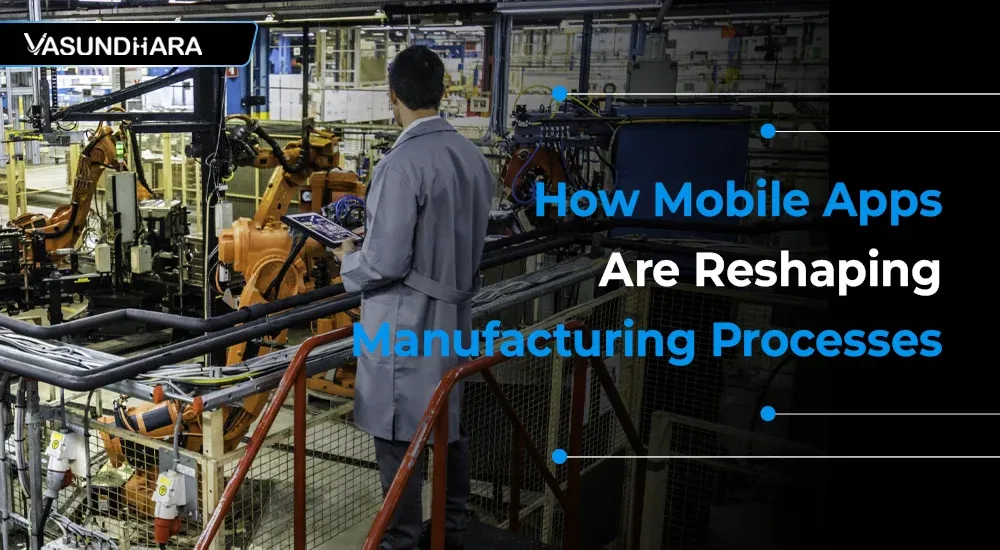How Mobile Apps Are Reshaping Manufacturing Processes


- Jan 16, 2024



As we go farther into the digital age, mobile app development has become essential to all business operations.
The manufacturing sector has historically been held accountable for the low adoption of new technologies among all industrial sectors.
And it appears that this trend will continue.
According to a survey, only 21% of manufacturing organizations believe they are well prepared for the problems that the new digital industrial revolution will provide.
Most businesses continue to utilize the old legacy system to operate their industrial operations. As a result, they have experienced maintenance, security, and compatibility issues.
Fortunately, with the arrival of 2024, things are changing.
Manufacturers have realized that the future is in the hands of a generation that relies on apps for everything and values custom software development solutions.
The mobile application industry continues to expand. The surge in the number of feature-rich smartphones and app consumers has led to an exponential rise in the demand for applications.
Here are some statistics and insights about the mobile app industry.
The global market for mobile application development is anticipated to reach $583.03 billion by 2030, expanding at a CAGR of 12.8% between 2022 and 2030.
McKinsey estimates that the effective integration of digital tools and technologies can result in the following benefits: an increase in throughput of 10% to 30%, worker productivity of 15% to 30%, and forecasting accuracy of up to 85%
91% of manufacturers believe that data collected from individuals and devices will reduce costs and improve decision-making. 81% of manufacturers, on the other hand, indicated a willingness to invest in innovative digital technologies to increase productivity..
The manufacturing industry previously operated in a conventional fashion, with business owners overseeing the process manually, resulting in the subsequent drawbacks:
The business owner's manual monitoring of all job tasks hindered their ability to focus solely on management-level planning.
Inaccurate assessment of the inventory leads to lost chances for sales.
Reverting or alerting customers can be a time-consuming process, which can lead to customer dissatisfaction.
Increase the likelihood of employees making mistakes.
Hire mobile app developers or partner with a reputed mobile app development company to build a mobile app that can help you overcome these challenges.
The manufacturing business is utilizing mobile app development practices to provide tailored app solutions that address operational, production, and management obstacles.
Below are various ways in which mobile app development is influencing the manufacturing industry.
In manufacturing, real-time monitoring and control is an essential component of mobile application development.
Real-time monitoring of manufacturing operations, such as inventory levels, production rates, and quality control, is made possible by mobile applications.
This provides managers and operators with real-time visibility into the status of their operations, enabling them to promptly detect and resolve any issues that may arise.
Mobile applications can notify users of anomalies or deviations from desired parameters through the use of real-time monitoring.
This facilitates prompt identification of problems, thereby facilitating a responsive approach and reducing the disruption to production.
The development of mobile applications enables real-time inventory tracking, supplying current data on stock locations, movements, and locations.
This feature provides real-time visibility into your inventory, eliminating the necessity for periodic or manual stock inspections.
Numerous inventory management applications that opted for custom software development now include barcode and QR code scanning capabilities by default.
This feature enables users to efficiently and precisely scan product identifiers in order to manage stock movements, update inventory records, and conduct stock counts.
You can access your inventory management system from anywhere, at any time, using a smartphone or tablet and mobile applications.
Before the introduction of smartphone apps, it took a lot of work to know where the goods was in the supply chain.
However, the manufacturing sector can now obtain real-time data on the location and status of commodities along the supply chain with the use of custom app development solutions.
From suppliers to customers, manufacturers have the ability to monitor the flow of raw materials, components, and completed goods at any point in the supply chain.
Proactive decision-making is made possible by the visibility that this real-time tracking ensures.
Manufacturers can interact in real time with suppliers, shipping companies, and customers by exchanging papers and information.
As a result, the supply chain's coordination, responsiveness, and communication gaps are all improved.
Mobile applications facilitate the acquisition of data in real-time across multiple phases of the manufacturing process.
Mobile devices can be utilized by quality control inspectors and laborers to perform inspections, document quality-related information directly into the application, and record measurements. By eliminating manual documentation, errors are reduced and data capture is guaranteed to be accurate and timely.
By utilizing mobile devices, inspectors are able to access these protocols, adhere to the sequential instructions provided, and record pertinent data and observations.
In addition, mobile applications enable streamlined defect reporting and monitoring. Personnel may utilize the application to record and communicate flaws, including photographs, detailed descriptions, and other pertinent data.
The aforementioned information is promptly accessible to quality control teams, facilitating their analysis and resolution of issues. Mobile applications enhance the overall quality of products by streamlining the process of defect resolution.
If additional functionality is required, integration with enterprise resource planning (ERP) or quality management system (QMS) systems is possible.
This integration facilitates the centralized administration of quality control processes and guarantees the smooth flow of data.
Today's clients expect everything at their fingertips. When we say "fingertips," we mean literally.
By 2024, every firm will have some type of software on the customer's smartphone.
When a customer needs something from the company, they only need to launch the mobile app.
Customers can view product information, place orders, track shipments, and receive personalized smartphone and tablet notifications.
This convenience improves the whole customer experience and builds loyalty.
Mobile apps in manufacturing provide a platform for displaying precise information about products and services, allowing clients to follow their orders in real time.
Furthermore, mobile apps can be customized to include loyalty programs and incentive systems that encourage user engagement and repeat purchases.
Do you have any mobile application ideas for your manufacturing enterprise?
Collaborate with the premier mobile app development company like Vasundhara Infotech to create a best-in-class mobile application for your business.
Mobile applications for manufacturing are created to tackle the distinct requirements and obstacles of the sector.
They provide an extensive array of functionalities that optimize operations, synchronize procedures, and enhance overall output.
The following characteristics render these applications essential for contemporary manufacturers:
Within the domain of manufacturing, data is an invaluable resource. Mobile applications that are outfitted with advanced data analytics functionalities offer up-to-the-minute operational insights.
They collect and convert data from a variety of sources, including equipment, sensors, and production lines, into actionable information.
This facilitates prompt, well-informed decision-making by manufacturers.
By connecting apparatus, equipment, and devices to the internet, the IoT has revolutionized manufacturing.
IoT sensors and devices are frequently integrated with manufacturing mobile applications. By means of this integration, equipment can be monitored and controlled in real-time, enabling manufacturers to identify potential problems prior to their escalation into costly failures or downtime.
By adopting a proactive stance towards equipment management, substantial operational expenses are mitigated and overall productivity is enhanced.
The enhancement of supply chain visibility facilitated by manufacturing mobile applications expands their functionality beyond the confines of the factory floor.
These applications provide functionalities that empower manufacturers to track the real-time mobility of materials and products.
The integration of barcoding, RFID, and GPS tracking technologies provides precise and current data regarding the whereabouts and condition of inventory.
Visibility into the supply chain enables manufacturers to optimize inventory levels, reduce the cost of excess inventory, and prevent stockouts.
For manufacturers, unscheduled equipment outages can incur significant expenses.
Predictive maintenance, which is enabled by mobile applications, forecasts equipment failure dates through the utilization of machine learning algorithms and data analysis.
Through the proactive identification of prospective issues, manufacturers are able to strategically schedule maintenance, thereby mitigating production disruptions.
Predictive maintenance mobile applications gather data from sensors and equipment, subsequently conducting analysis to identify anomalies and patterns that may serve as indicators of imminent equipment failures.
Sensitive data, such as customer information, intellectual property, and compliance regulations, are handled in the manufacturing sector.
Manufacturing mobile applications place a premium on security and compliance. Secure data storage, user authentication, and encryption are implemented to safeguard sensitive information against illicit access and cyber threats.
Furthermore, these applications aid producers in complying with regulations and standards that are specific to their industry.
By enabling document management, audit trails, and compliance reporting, they guarantee the organization's adherence to regulations pertaining to quality, safety, and the environment.
The manufacturing industry can see a multitude of beneficial impacts through digital transformation, with mobile applications being especially influential.
By decreasing waste and lowering defective items, implementing inventory management becomes effortless and obstacles in supply chain management are eliminated.
This automation and streamlining of workflow can significantly enhance the productivity and efficiency of your manufacturing organization.
At Vasundhara Infotech, we leverage our extensive market research capabilities across mobile technology to contribute to the development of a more promising future.
For numerous years, we have conducted qualitative and quantitative research projects for our clients, establishing ourselves as the benchmark for credible technical research. Get in touch with us today.
Copyright © 2026 Vasundhara Infotech. All Rights Reserved.